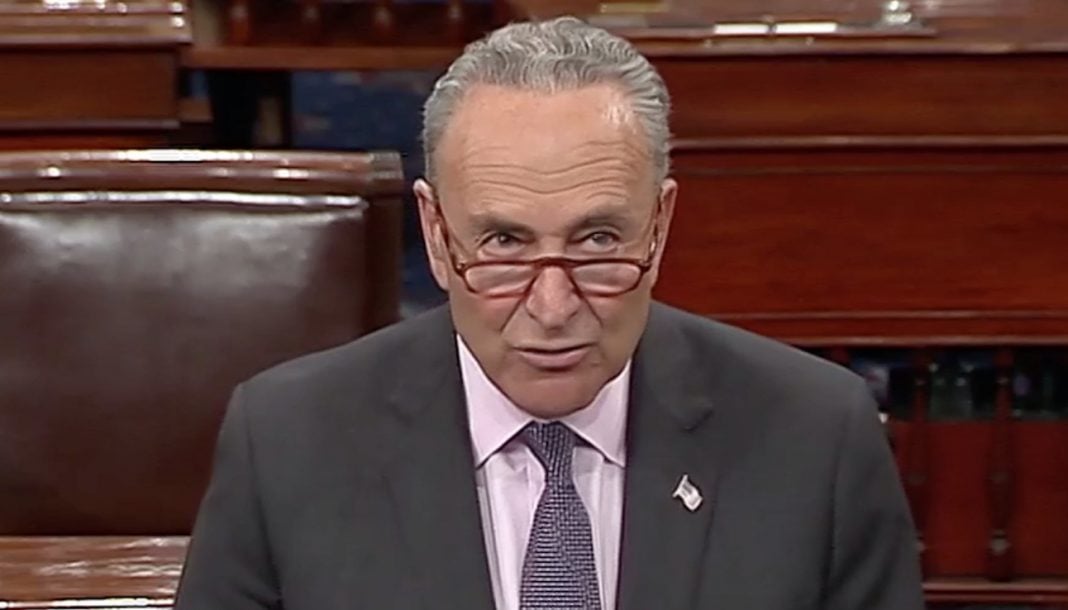Schumer: Covid package includes no-appointment vaccination centers for Hudson Valley
With the U.S. House of Representatives targeting Feb. 26 for a vote on passage of the $1.9 trillion Covid-19 Relief Package that would then require Senate approval, U.S. Senate Majority Leader Chuck Schumer of New York told a webinar arranged by the Hudson Valley Economic Development Council (HVEDC) that the package would have specific benefits for the region.
Mike Oates, president and CEO of the HVEDC, hosted the webinar.

“This new bill includes huge amounts of money to get the (Covid-19) vaccine off the shelves and into people”™s arms, and more money to produce more vaccines,” Schumer told Oates. “They”™re going to set up centers ”” many in the Hudson Valley ”” where people can line up and just get the vaccine.”
Right now, residents need to schedule vaccinations with New York state or suppliers such as pharmacies and for many the scheduling process has been a nightmare.
Schumer said the centers would be run by FEMA and the National Guard and that they would be training 100,000 temporary health care workers to administer the vaccinations, which will be free. Schumer said that he believes with mass vaccinations in high gear, life could return to at least some semblance of normal as early as June or July.
The new bill also includes $325 billion for small businesses, as well as nonprofits and religious institutions. The ability for nonprofits and religious institutions to benefit from previous federal Covid relief had been limited.
“There is a set aside for CDFI”™s, Community Development Financial Institutions, and MDFI”™s, Minority Development Financial Institutions, so small businesses can apply and they will help you,” Schumer said. “Places like Community Capital Resources in Westchester, they have been given money to have people sitting there just to help you apply for these programs.”
A new program for restaurants and bars hurt by the pandemic would receive $25 billion. The grants can be used to cover payroll, rent, utilities and other operational expenses.
The bill also provides another $7.25 billion for the Paycheck Protection Program, a tiny fraction of what was allocated in previous legislation. The loans are designed to help borrowers meet their payroll and operating costs and can potentially be forgiven.
“It”™s estimated that restaurants lost over $135 billion in sales last year. In New York, 8,300 restaurants have shut their doors,” Schumer said. “PPP was of some help, but the fact that 75% of that went to payroll wasn”™t good. This Restaurant Act is in addition to PPP; it”™s a long term grant. So if you have a restaurant, you could get the PPP and then get the restaurant money.”
Within the new relief package is $15 billion in aid for independent arts venues, movie theaters, live performance spaces and similar organizations. The grant program would cover 45% of an organization”™s annual revenues, with a cap of $10 million.
Schumer said a feature known as the Endless Frontier Act would inject $100 billion over five years into advanced technology initiatives including cybersecurity, artificial intelligence, clean energy and biotech, in addition to semiconductor and microchip production. Schumer said it would include $10 billion to create technology hubs, including in the Hudson Valley and Westchester County.
“This kind of investment in semiconductor and microchip production means that companies like IBM or ON Semiconductor, which is coming to Dutchess, can expand, bringing good jobs to our economy,” Schumer said.
Schumer said that passing separate legislation which has been introduced in the Senate and House to eliminate the $10,000 cap on deducting state and local taxes (SALT) from federal tax returns was a priority for him as was funding infrastructure projects including the widening of Route 17. He also said he”™ll continue to push $3.2 billion for emergency broadband benefits to help families who can”™t afford high-speed internet access so that remote learning can be available to all students.
Staff writer Peter Katz contributed to this report.
